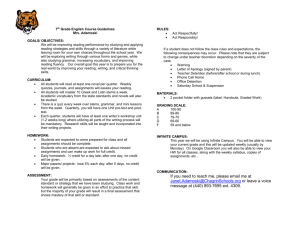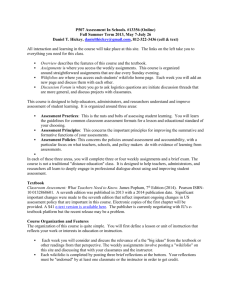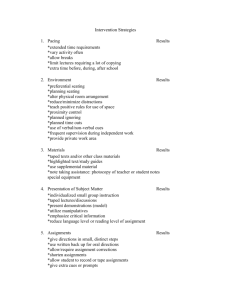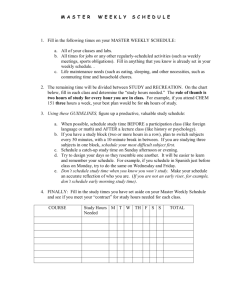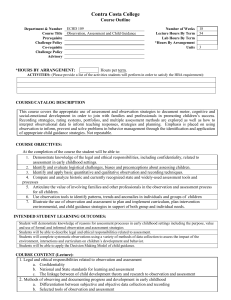Learning, Section 2 (PSYC 309)
advertisement
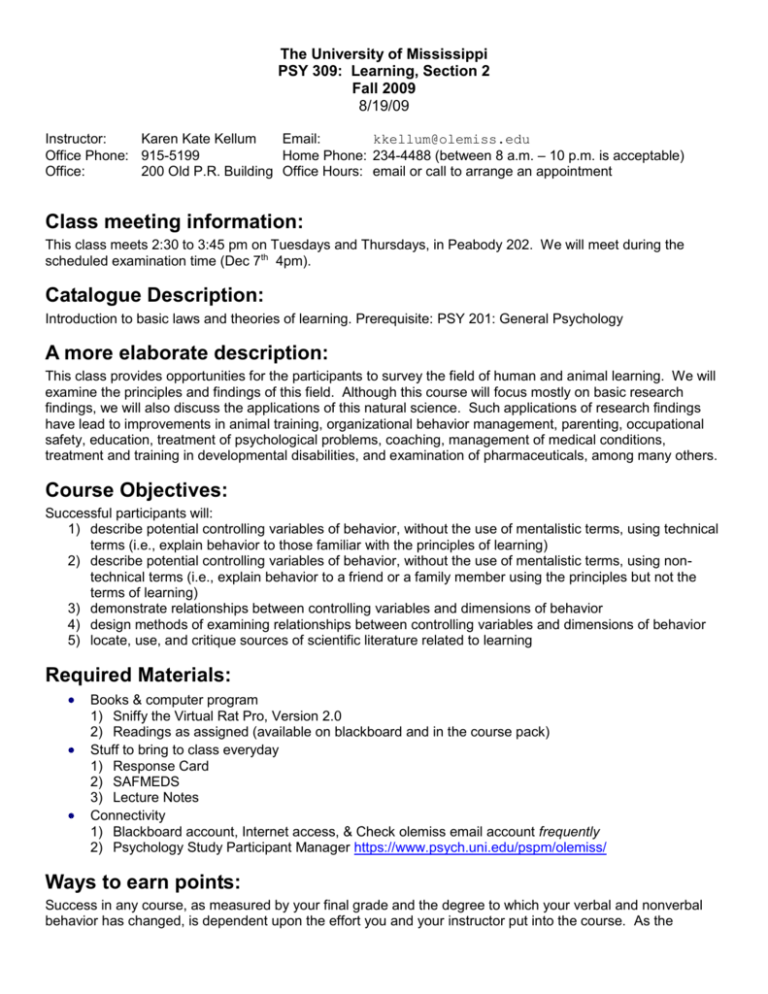
The University of Mississippi PSY 309: Learning, Section 2 Fall 2009 8/19/09 Instructor: Karen Kate Kellum Email: kkellum@olemiss.edu Office Phone: 915-5199 Home Phone: 234-4488 (between 8 a.m. – 10 p.m. is acceptable) Office: 200 Old P.R. Building Office Hours: email or call to arrange an appointment Class meeting information: This class meets 2:30 to 3:45 pm on Tuesdays and Thursdays, in Peabody 202. We will meet during the scheduled examination time (Dec 7th 4pm). Catalogue Description: Introduction to basic laws and theories of learning. Prerequisite: PSY 201: General Psychology A more elaborate description: This class provides opportunities for the participants to survey the field of human and animal learning. We will examine the principles and findings of this field. Although this course will focus mostly on basic research findings, we will also discuss the applications of this natural science. Such applications of research findings have lead to improvements in animal training, organizational behavior management, parenting, occupational safety, education, treatment of psychological problems, coaching, management of medical conditions, treatment and training in developmental disabilities, and examination of pharmaceuticals, among many others. Course Objectives: Successful participants will: 1) describe potential controlling variables of behavior, without the use of mentalistic terms, using technical terms (i.e., explain behavior to those familiar with the principles of learning) 2) describe potential controlling variables of behavior, without the use of mentalistic terms, using nontechnical terms (i.e., explain behavior to a friend or a family member using the principles but not the terms of learning) 3) demonstrate relationships between controlling variables and dimensions of behavior 4) design methods of examining relationships between controlling variables and dimensions of behavior 5) locate, use, and critique sources of scientific literature related to learning Required Materials: Books & computer program 1) Sniffy the Virtual Rat Pro, Version 2.0 2) Readings as assigned (available on blackboard and in the course pack) Stuff to bring to class everyday 1) Response Card 2) SAFMEDS 3) Lecture Notes Connectivity 1) Blackboard account, Internet access, & Check olemiss email account frequently 2) Psychology Study Participant Manager https://www.psych.uni.edu/pspm/olemiss/ Ways to earn points: Success in any course, as measured by your final grade and the degree to which your verbal and nonverbal behavior has changed, is dependent upon the effort you and your instructor put into the course. As the instructor, I believe it is my job to arrange conditions under which you are likely to successfully meet the objectives of this course. Instead of major cumulative exams, this class arranges multiple frequent opportunities for students to practice and demonstrate skills related to the course objectives. This is slightly unusual; therefore, the point-system can be difficult to understand. Please pay close attention to this section of the syllabus and seek additional information as required. It is University policy to provide, on a flexible and individual basis, reasonable accommodations to students who have disabilities that may affect their ability to participate in course activities or meet course requirements. Students with disabilities, which have been verified through the Office of Student Disability Services, are encouraged to contact me to discuss their individual needs for accommodations You may meet the point requirements for whatever grade you plan to earn in this class by completing all, or some of the assignments listed below (descriptions of each found on Blackboard). There are two required assessments: 1. Plan for Demonstrating Class Objectives (due second week of class) 2. Exit Survey/Final (due during final exams) You may choose any or all of the other assignments to complete. Please note that: 1) all assignments have due dates (see late assignments below) 2) the number of points available on an assignment & the number you earn are not necessarily equal 3) the correlation coefficient between class attendance and final grade is very high (r2 ≈ 0.70). Assignment Menu (Required) Plan for Demonstrating Class Objectives Class Assignments & Quizzes “Live” SAFMEDS “Labs” Weekly On-Line SAFMEDS Weekly On-Line Test / Blackboard Assignment Sniffy: The Virtual Rat exercises Journal Article Review Research Study Proposal (Required) Cumulative Final Survey Participation studies in UM’s psychology department Maximum Number Maximum Points 1 29 3 2 14 14 40 2 1 1 5 20 50 20 10 10 5 50 75 50 5 hours 4 Total Possible Points Potential Points 5 580 150 40 140 140 200 100 75 50 20 1500 Variable Points Self-proposed assignments can be arranged (up to 2) Grades: Grade Number of points needed A 1000 B 800 C 700 D 600 To earn an “A” or “B” in this course students must complete the Plan for Demonstrating Class Objectives and the Final Survey as well as accumulate the specific number of points. Academic Conduct: “The University is conducted on a basis of common honesty. Dishonesty, cheating or plagiarism, or knowingly furnishing false information to the University are regarded as particularly serious offenses.” (M Book, p. 4). In some cases, students are unaware of the specific behaviors which can be considered as plagiarism; however, this is not an excuse for such behaviors (see pages 292-294 of the APA style guide for information). Minimally, a student found cheating or plagiarizing in this class will be given a zero for the assignment. Academic misconduct will be reported and in the vast majority of cases, such actions could lead to failing the course and disciplinary action by the university. Grade Appeals: If the student wishes to dispute a grade on any assignment, he/she may do so by writing a reasonable explanation and turning it in with the graded assignment. The instructors will evaluate this explanation to determine if no, partial, or complete credit will be given. Attendance and late assignments: I believe that you have the greatest opportunity to learn when you have multiple opportunities to practice, and that classes provide such opportunities. Therefore, I expect students to attend classes, arrive on time, and stay until the end of class. Students have a choice whether or not to attend class; however, when you do I also expect you to reduce the number of potential distractions during class (i.e., no reading other materials, no text messaging, no phone calls, no crossword puzzles, no studying for other classes). In every class period, students have the opportunity to earn up to 20 points. The only way to earn these points is to be in class and to participate in all of the classroom activities (i.e., you cannot “make-up” in-class assignments). All assignments are due on-line by 6pm on the scheduled date (see the course schedule). Students may turn assignments in early for feedback. For late assignments, the instructor will take off the following percentage of the possible points before grading: How Late? Percent Off Example: Highest possible for assignment worth 50 points After 6pm or the 5% 47.5 Next day 2-7 days 10% 45 7-14 days 50% 25 15 + days 100% 0 n.b. SAFMEDS and On-Line Weekly Quizzes not be available after the due date. Blackboard Information http://blackboard.olemiss.edu/ (login page) Modifications to syllabus and assignments I reserve the right to modify this syllabus during the course of the semester after notification to the class. An Outline for PSY 309:02 Learning Kellum – Fall 2009 The basics o Reading Research o Contextualism Successful working vs. causation Biological/Environmental…. Act in Context Context/Act is whole – any divisions/classifications are only to allow successful working o Natural Science of Behavior Phylogeny & Ontogeny Stimulus functions Measurable dimensions of behavior & stimuli Reading Graphs and Graphing data Environmental manipulations & control Elicited Behavior – Respondent Behavior o Elicitation o Stimulus Presentation over time (learning over time) Habituation Sensitization Summation Potentation o Stimulus Control Superimposed on Stimulus Presentation - Conditioned Elicitation Learning responses in new situations Transfer of stimulus function Excitatory (appetitive) Inhibitory (aversive) Conditioned Taste Aversion Extinction Spontaneous Recovery Controls Compound Conditioning Blocking Overshadowing Sensory Preconditioning Higher-Order Conditioning Consequential Control o Reinforcement – Learning to do something or do something more Change from mazes to operant chamber Three things necessary (B, Change, Increase) Effectiveness of reinforcers Discriminations Positive – Negative Appetitive - Aversive Conditioned – Unconditioned (transfer of stimulus function) Intrinsic – Extrinsic Conditioned – Generalized Conditioned Reinforcer Shaping Response Generalization - Induction Extinction Extinction Burst Variation in Behavior Spontaneous Recovery Resurgence Schedules of Reinforcement Basic Schedules Partial-Reinforcement Effect Post Reinforcement Pause Combined Schedules Matching Law Adjunctive Behavior o Research animals (Activity Anorexia, Polydipsia) o Humans o Punishment – Learning not to do something Three things necessary (B, Change, Decrease) Discriminations Positive – Negative Aversive – Appetitive Aversive – Noxious Punishment – Aversive Punishment – Noxious Effectiveness of punishers Aversive Control & Counter Control Establishing Operations – Effects for Learning o Revisiting the effectiveness of reinforcers Operants – the Whole Story Stimulus Control superimposed on Consequential Control – learning to respond in the right situation o Stimulus Discrimination (schedules of reinforcement with antecedent control) SD S Escape from unconditioned aversives Escape from conditioned aversives (avoidance) o Stimulus Generalization o Generalized Operants - Modeling/Imitation Relational Responding o Transfer of Stimulus Function o Learning to respond relationally Reflexity Symmetry – Mutual Entailment Transitivity – Combinatorial entailment Transformation of function o Human vs other critters performance o What that gets the organism Verbal behavior Remembering Rule-Governed Behavior Dreaming Self-Knowledge week day 1 1 8/25/09 How to read a research article 2 8/27/09 Contexualism Natural Science of Behavior (Phylogeny, 9/1/09 Ontogeny, …) 2 3 4 3 4 5 6 7 8 date 9/3/09 Graphing, Environmental Manipulations 5 6 9/8/09 Elicitation 9/10/09 Conditioned Elicitation 7 9/15/09 Conditioned Elicitation - Inhibitory 8 9/17/09 9 9/22/09 10 9/24/09 11 9/29/09 12 10/1/09 13 10/6/09 14 10/8/09 15 10/13/09 16 10/15/09 9 10 11 12 13 17 18 19 20 21 22 23 24 25 10/20/09 10/22/09 10/27/09 10/29/09 11/3/09 11/5/09 11/10/09 11/12/09 11/17/09 26 11/19/09 14 Conditioned Elicitation Compound Conditioning & Controls, and interesting stuff Reinforcement - Chambers, effectiveness, discriminations Reinforcement - Extinction, Resurgence & Differential Reinforcement Reinforcement - Shaping, Chaining, Reinforcement - Basic Schedules of Reinforcement Reinforcement - Matching Law Adjuctive Behavior Punishment - Discriminations, Effectiveness Punishment - Aversive Control & Counter Control Establishing Operations Operants - the whole story Stimulus Discrimination Stimulus Generalization Generalized Operants Relational Responding Relational Responding Verbal Behavior & Rule-Governed Behavior Self-Knowledge Other Complex behavior - remembering, dreaming Assignments Due Objective Plan SAFMEDS 1, Weekly 1 SAFMEDS 2, Weekly 2, Lab 1 (Excel) Sniffy 1-9 SAFMEDS 3, Weekly 3 First possible day for Live SAFMEDS, Sniffy 10-21 Lab 2 (APA), SAFMEDS 4, Weekly 4 Article Review 1, Sniffy 22-27 SAFMEDS 5, Weekly 5 SAFMEDS 6, Weekly 6 Sniffy 31-36 SAFMEDS 7, Weekly 7 Sniffy 28-30 SAFMEDS 8, Weekly 8 Article Review 2 SAFMEDS 9, Weekly 9 Sniffy 37-42 SAFMEDS 10, Weekly 10 Sniffy 43-46 SAFMEDS 11, Weekly 11 SAFMEDS 12, Weekly 12 Research Proposal SAFMEDS 13, Weekly 13 Last day for selfproposed assignments 11/24/09 Thanksgiving Break 11/26/09 27 12/1/09 Blurring of the operant-respondent distinction 28 15 topic 12/3/09 TBA 29 12/07/08 Learning in Learning? SAFMEDS 14, Weekly 14, Last day for Live SAFMEDS Final Exam due by 12/08 at 6pm
